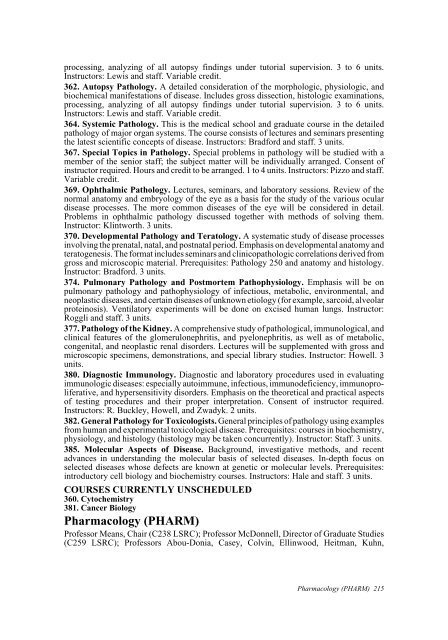2005-06 - Office of the Registrar - Duke University
2005-06 - Office of the Registrar - Duke University
2005-06 - Office of the Registrar - Duke University
You also want an ePaper? Increase the reach of your titles
YUMPU automatically turns print PDFs into web optimized ePapers that Google loves.
processing, analyzing <strong>of</strong> all autopsy findings under tutorial supervision. 3 to 6 units.<br />
Instructors: Lewis and staff. Variable credit.<br />
362. Autopsy Pathology. A detailed consideration <strong>of</strong> <strong>the</strong> morphologic, physiologic, and<br />
biochemical manifestations <strong>of</strong> disease. Includes gross dissection, histologic examinations,<br />
processing, analyzing <strong>of</strong> all autopsy findings under tutorial supervision. 3 to 6 units.<br />
Instructors: Lewis and staff. Variable credit.<br />
364. Systemic Pathology. This is <strong>the</strong> medical school and graduate course in <strong>the</strong> detailed<br />
pathology <strong>of</strong> major organ systems. The course consists <strong>of</strong> lectures and seminars presenting<br />
<strong>the</strong> latest scientific concepts <strong>of</strong> disease. Instructors: Bradford and staff. 3 units.<br />
367. Special Topics in Pathology. Special problems in pathology will be studied with a<br />
member <strong>of</strong> <strong>the</strong> senior staff; <strong>the</strong> subject matter will be individually arranged. Consent <strong>of</strong><br />
instructor required. Hours and credit to be arranged. 1 to 4 units. Instructors: Pizzo and staff.<br />
Variable credit.<br />
369. Ophthalmic Pathology. Lectures, seminars, and laboratory sessions. Review <strong>of</strong> <strong>the</strong><br />
normal anatomy and embryology <strong>of</strong> <strong>the</strong> eye as a basis for <strong>the</strong> study <strong>of</strong> <strong>the</strong> various ocular<br />
disease processes. The more common diseases <strong>of</strong> <strong>the</strong> eye will be considered in detail.<br />
Problems in ophthalmic pathology discussed toge<strong>the</strong>r with methods <strong>of</strong> solving <strong>the</strong>m.<br />
Instructor: Klintworth. 3 units.<br />
370. Developmental Pathology and Teratology. A systematic study <strong>of</strong> disease processes<br />
involving <strong>the</strong> prenatal, natal, and postnatal period. Emphasis on developmental anatomy and<br />
teratogenesis. The format includes seminars and clinicopathologic correlations derived from<br />
gross and microscopic material. Prerequisites: Pathology 250 and anatomy and histology.<br />
Instructor: Bradford. 3 units.<br />
374. Pulmonary Pathology and Postmortem Pathophysiology. Emphasis will be on<br />
pulmonary pathology and pathophysiology <strong>of</strong> infectious, metabolic, environmental, and<br />
neoplastic diseases, and certain diseases <strong>of</strong> unknown etiology (for example, sarcoid, alveolar<br />
proteinosis). Ventilatory experiments will be done on excised human lungs. Instructor:<br />
Roggli and staff. 3 units.<br />
377. Pathology <strong>of</strong> <strong>the</strong> Kidney. A comprehensive study <strong>of</strong> pathological, immunological, and<br />
clinical features <strong>of</strong> <strong>the</strong> glomerulonephritis, and pyelonephritis, as well as <strong>of</strong> metabolic,<br />
congenital, and neoplastic renal disorders. Lectures will be supplemented with gross and<br />
microscopic specimens, demonstrations, and special library studies. Instructor: Howell. 3<br />
units.<br />
380. Diagnostic Immunology. Diagnostic and laboratory procedures used in evaluating<br />
immunologic diseases: especially autoimmune, infectious, immunodeficiency, immunoproliferative,<br />
and hypersensitivity disorders. Emphasis on <strong>the</strong> <strong>the</strong>oretical and practical aspects<br />
<strong>of</strong> testing procedures and <strong>the</strong>ir proper interpretation. Consent <strong>of</strong> instructor required.<br />
Instructors: R. Buckley, Howell, and Zwadyk. 2 units.<br />
382. General Pathology for Toxicologists. General principles <strong>of</strong> pathology using examples<br />
from human and experimental toxicological disease. Prerequisites: courses in biochemistry,<br />
physiology, and histology (histology may be taken concurrently). Instructor: Staff. 3 units.<br />
385. Molecular Aspects <strong>of</strong> Disease. Background, investigative methods, and recent<br />
advances in understanding <strong>the</strong> molecular basis <strong>of</strong> selected diseases. In-depth focus on<br />
selected diseases whose defects are known at genetic or molecular levels. Prerequisites:<br />
introductory cell biology and biochemistry courses. Instructors: Hale and staff. 3 units.<br />
COURSES CURRENTLY UNSCHEDULED<br />
360. Cytochemistry<br />
381. Cancer Biology<br />
Pharmacology (PHARM)<br />
Pr<strong>of</strong>essor Means, Chair (C238 LSRC); Pr<strong>of</strong>essor McDonnell, Director <strong>of</strong> Graduate Studies<br />
(C259 LSRC); Pr<strong>of</strong>essors Abou-Donia, Casey, Colvin, Ellinwood, Heitman, Kuhn,<br />
Pharmacology (PHARM) 215









